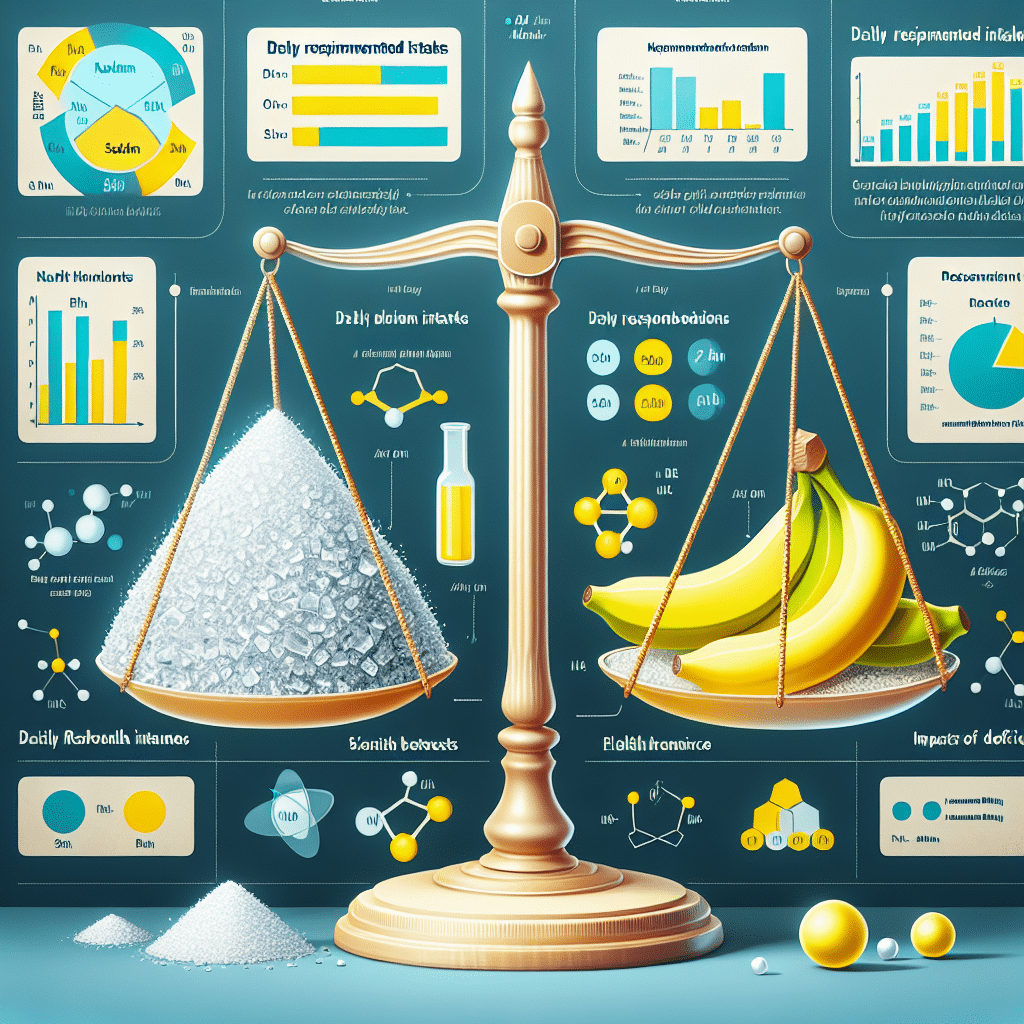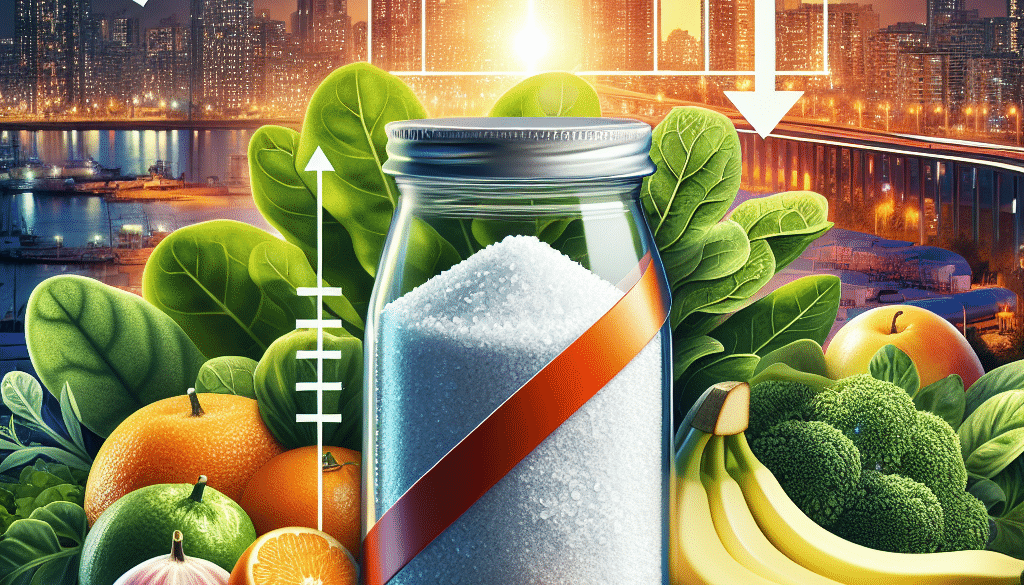Dietary Reference Updates: Sodium and Potassium’s New Intakes
-
Table of Contents
- Sodium and Potassium Intake: Essential Updates to Dietary References
- The Importance of Sodium and Potassium in the Diet
- Recent Updates to Dietary Reference Intakes
- Updated Sodium Intake Recommendations
- Updated Potassium Intake Recommendations
- Implications of the New Intake Guidelines
- Strategies for Adhering to the New Recommendations
- Case Studies and Statistics
- Conclusion: Embracing the New Dietary Reference Intakes
- Enhance Your Diet with ETChem’s Protein Products
Sodium and Potassium Intake: Essential Updates to Dietary References

Understanding the importance of maintaining a balanced diet is crucial for overall health and well-being. Two minerals that play a significant role in this balance are sodium and potassium. Recent updates to dietary reference intakes for these essential nutrients have sparked discussions among health professionals and the public alike. This article delves into the latest recommendations and the science behind them, offering insights into how these changes might impact our daily dietary choices.
The Importance of Sodium and Potassium in the Diet
Sodium and potassium are electrolytes that are vital for numerous bodily functions. They help regulate fluid balance, blood pressure, and are critical for nerve function and muscle contraction. However, the consumption of these minerals must be carefully balanced, as both an excess and a deficiency can lead to health issues.
Recent Updates to Dietary Reference Intakes
The dietary reference intakes (DRIs) for sodium and potassium have been updated by authoritative bodies such as the National Academies of Sciences, Engineering, and Medicine (NASEM). These updates are based on extensive research and are intended to guide individuals towards healthier dietary patterns.
Updated Sodium Intake Recommendations
The latest guidelines suggest a reduction in daily sodium intake for adults. The recommended upper limit has been set to 2,300 milligrams per day, which is roughly equivalent to one teaspoon of table salt. This update reflects the growing concern over high sodium consumption and its link to increased blood pressure and risk of cardiovascular diseases.
Updated Potassium Intake Recommendations
Conversely, the recommendations for potassium intake have been increased. Adults are now advised to consume between 2,600 and 3,400 milligrams of potassium per day, depending on age and sex. This change acknowledges potassium’s role in counteracting the negative effects of high sodium intake and its benefits for heart health.
Implications of the New Intake Guidelines
The updated DRIs for sodium and potassium have significant implications for public health policies, food labeling, and consumer behavior. They emphasize the need for a dietary shift towards foods naturally low in sodium and high in potassium.
- Public Health Policies: Governments and health organizations may use these guidelines to develop campaigns and programs aimed at reducing sodium consumption and increasing potassium intake.
- Food Labeling: The food industry might be encouraged to reformulate products to align with these new recommendations, leading to clearer labeling and healthier options for consumers.
- Consumer Behavior: Awareness of these updates can empower individuals to make more informed choices about their diet and seek out foods that support these dietary goals.
Strategies for Adhering to the New Recommendations
Adapting to the new DRIs can be challenging, but there are several strategies that individuals can employ to meet these guidelines:
- Reducing salt intake by cooking at home and using herbs and spices for flavoring instead of salt.
- Choosing fresh or frozen fruits and vegetables, which are naturally low in sodium and high in potassium.
- Reading food labels to select products with lower sodium content and higher potassium levels.
- Incorporating potassium-rich foods such as leafy greens, bananas, oranges, and potatoes into the diet.
Case Studies and Statistics
Several studies have highlighted the benefits of adhering to the updated DRIs for sodium and potassium. For instance, research has shown that reducing sodium intake can lead to a significant decrease in blood pressure levels, particularly in individuals with hypertension. Additionally, increased potassium intake has been associated with a lower risk of stroke and heart disease.
Statistics from the Centers for Disease Control and Prevention (CDC) indicate that the average American consumes more than 3,400 milligrams of sodium per day, well above the recommended limit. This underscores the need for dietary changes in line with the new guidelines.
Conclusion: Embracing the New Dietary Reference Intakes
The updated dietary reference intakes for sodium and potassium reflect the latest scientific evidence and aim to improve public health. By understanding and implementing these recommendations, individuals can take proactive steps towards a healthier diet and lifestyle. The key takeaways include reducing sodium intake to no more than 2,300 milligrams per day and increasing potassium intake to between 2,600 and 3,400 milligrams per day, depending on individual factors.
Enhance Your Diet with ETChem’s Protein Products
In addition to monitoring sodium and potassium intake, incorporating high-quality protein into your diet is essential for overall health. ETChem’s protein products, including their diverse range of collagens, can be a valuable addition to a balanced diet. Their products are designed to cater to various industries and dietary needs, ensuring that you can find the right protein supplement to complement your dietary goals.
About ETChem:
ETChem, a reputable Chinese Collagen factory manufacturer and supplier, is renowned for producing, stocking, exporting, and delivering the highest quality collagens. They include marine collagen, fish collagen, bovine collagen, chicken collagen, type I collagen, type II collagen and type III collagen etc. Their offerings, characterized by a neutral taste, instant solubility attributes, cater to a diverse range of industries. They serve nutraceutical, pharmaceutical, cosmeceutical, veterinary, as well as food and beverage finished product distributors, traders, and manufacturers across Europe, USA, Canada, Australia, Thailand, Japan, Korea, Brazil, and Chile, among others.
ETChem specialization includes exporting and delivering tailor-made collagen powder and finished collagen nutritional supplements. Their extensive product range covers sectors like Food and Beverage, Sports Nutrition, Weight Management, Dietary Supplements, Health and Wellness Products, ensuring comprehensive solutions to meet all your protein needs.
As a trusted company by leading global food and beverage brands and Fortune 500 companies, ETChem reinforces China’s reputation in the global arena. For more information or to sample their products, please contact them and email karen(at)et-chem.com today.




